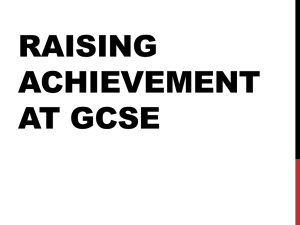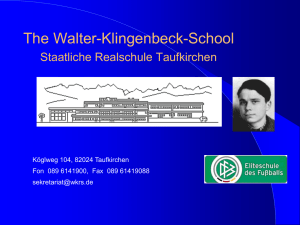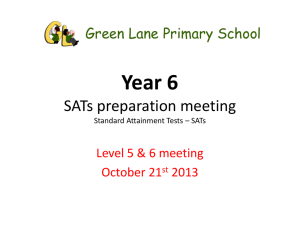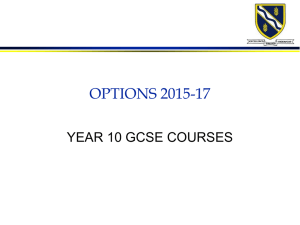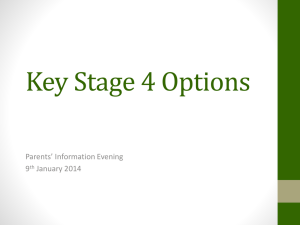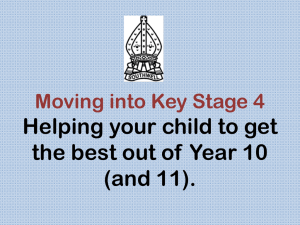Assessment - Optimus Education
advertisement
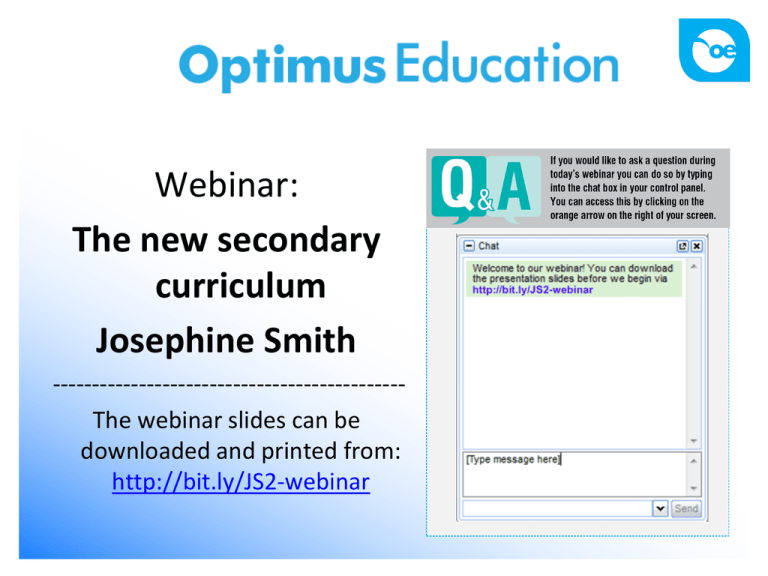
Webinar: The new secondary curriculum Josephine Smith --------------------------------------------The webinar slides can be downloaded and printed from: http://bit.ly/JS2-webinar ‹#› The basics.... The revised National Curriculum must be implemented by all maintained schools in England from September 2014 (with the exception of core subjects in Years 10 and 11) Details can be found at www.gov.uk/government/collections/national-curriculum In this webinar: • Content: What to teach • Assessment: How and when, in a world without levels • Accountability: What will Ofsted expect? Progress 8 • Timelines: What needs doing, by when? The new curriculum: content Subject content has already been published for GCSE English language, English literature and maths and it is clear that the content is greater than that of the current GCSEs, which has significant implications for curriculum planning throughout the school. Most schools are starting from this understanding and working backwards. Anticipated GCSE content, as well as appreciation of Key Stage 2 changes, are informing Key Stage 3 revisions. Maths and English In Maths the curriculum is significantly different from the current programmes of study: there is much more content, with the new qualification being referred to as the ‘big fat maths GCSE'. The English curriculum is also considerably different, with wider and more challenging reading and the introduction of the ‘unseen’ element in literature. From 2017 there will no longer be a combined language and literature qualification. The new Progress 8 measure (from 2016) effectively means that all students will need to be entered for language and literature as English will not be double-counted unless both have been taken. Other subjects Other departments will need to undertake an analysis once they are clear about the GCSE content proposed for their subject. Ofqual will be consulting on arrangements for other subjects during 2014 and specifications will be in schools in autumn 2015 for first teaching from 2016. Some of the programmes of study for Key Stage 3 beyond the core are minimal and teachers may find that they do not need to make substantial changes. All schools are required to provide information about their curriculum and their assessment policy on the school website and these will be scrutinised by Ofsted. You don't need to revise all schemes of work at once! Until 2016, when Year 7 students arrive in Key Stage 3 having covered the revised Key Stage 2 curriculum in core subjects, it will not be possible to teach the revised Key Stage 3 core curriculum as it stands as those students will have gaps in their knowledge For the years 2014 to 2016, English and maths departments are advised to develop a transitional approach, taking account of the new GCSEs and working backwards to analyse what Key Stage 3 students in each year group have already covered and what they will need to cover to succeed at GCSE. Subject content has already been published and awarding bodies are expected to make the specifications available to schools by autumn 2014 (English and maths) for first teaching from September 2015. The new curriculum: assessment The Year 9 cohort this September will have only one year of Key Stage 3 to prepare for starting the new GCSE curriculum in English and maths. They will be the first to take the new GCSE examinations in the summer of 2017 and will need to be prepared not only for the different content, but also for the new style of examinations. Both students and teachers will need help preparing for terminal, external exam only assessment. The changes to the type of external assessment are a whole-school issue for next September's Year 8 cohort, who will take the full set of the new GCSEs in summer 2018. They need to be prepared for longer, terminal exams with more extended writing and more emphasis on accuracy and fluency of written English. The new curriculum: assessment In this revised curriculum, the national system of formative assessment based on levels disappears. There is no requirement to report at the end of Key Stage 3 assessment either to the government or to parents. ‘Replacing National Curriculum levels’, Daisy Christodoulou, The Wing to Heaven blog: http://bit.ly/TikLr0 Assessment: ideas for English ‘The elements of language: what we are using in place of levels’, Phil Stock, Must Do Better blog: http://bit.ly/1nFw3Ol Assessment: ideas for maths ‘The maths curriculum in Year 7-9 has been broken down into topics – approximately 15 per year. Each of these topics is individually assessed and given a score out of 100. This score is computed from three elements: an in-class quiz, homework results, and an end-of-term test. Students then get an overall percentage score, averaged from all of the topics they have studied so far. This means that for each student we have an indication of their overall proficiency at maths, as well as detailed information on their proficiency at each individual topic. This is recorded by students, stored by teachers, and reported to parents six times a year.’ Extract from the Year 7 assessment record sheet: ‘An assessment system that works’, David Thomas, Mr Thomas’ Maths blog: http://bit.ly/1ivzbQN Assessment in your school Schools will still be expected to have an assessment policy and a process of internal assessment to enable them to track student progress and report annually (or more often) to parents but these will be of the school’s own devising. DfE guidance states “Beyond the tests at Key Stage 2 and GCSEs at Key Stage4, it will be for schools to decide how they assess pupils’ progress.” Ofsted will be responsible for monitoring the effectiveness of schools’ assessment policies and practices. Are you keeping levels for the time being? It will not be possible to retain the current level-based system over time as the curriculum will change to adapt to new GCSEs. Don't worry, though; Wilshaw himself agreed that schools would need to manage these changes over time and that schools sticking with levels next year (or beyond) would not meet with Ofsted disapproval during this transitional time. Assessment in your school To this end, an effective assessment process should: • set targets • track progress against expectations • demonstrate what students know, understand and can do through assessment which is best fitted to the learning objectives • diagnose areas of strength and weakness • support teacher planning • provide clear and easily understood information for students and parents • provide information for other schools at any point of transition • provide internal monitoring information for middle and senior leaders and governors. A timeline for you to follow This term (spring to summer 2014) • Curriculum planning • Develop a transitional Key Stage 3 curriculum model • Develop and publish a transitional Key Stage 3 assessment policy • Develop a staff training programme • Review the staffing structure • Consider the implications of Progress 8 for curriculum planning and options A timeline for you to follow Actions to take in the academic year 2014-15 • Implement transitional Key Stage 3 curriculum and assessment. • Implement new Key Stage 4 curriculum for citizenship, computing and PE (maintained sector). • Plan for first teaching of new GCSEs in English and maths in 2015-17. • Implement a professional learning programme. • Develop a whole-school approach to preparing students for new qualifications. • Communicate with parents and students. • Prepare for Progress 8 with your own shadow data • Undertake staffing needs analysis for curriculum changes. A timeline for you to follow Actions to take in the academic year 2015-16 • Implement changes for GCSE in English and maths in Year 10. • Prepare for new GCSEs in subjects in addition to English and maths. • Adapt the Key Stage 3 curriculum for subjects other than English and maths where necessary. • Continue to implement the professional learning programme. • Develop a final Key Stage 3 curriculum model (for Year 7 in September 2016). • Develop and publish a final assessment policy (New descriptors and targets reflect new Key Stage 2 and new GCSEs, within a progressive structure). • Communicate with students and parents A timeline for you to follow Actions to take in the academic year 2016-17 • Implement changes for Key Stage 3 curriculum and assessment. • Implement changes for new GCSEs in subjects other than English and maths. Key dates These are the first GCSE and A-levels that are changing, and the dates the new draft specifications will be available from exam boards: 29 May • GCSE English • GCSE Maths 5 June • AS and A-level Art and design • AS and A-level History • AS and A-level Sociology 12 June • AS and A-level Business • AS and A-level Computer science • AS and A-level Economics 19 June • AS and A-level English language • AS and A-level English literature • AS and A-level English language and Literature 26 June • AS and A-level Biology • AS and A-level Chemistry • AS and A-level Physics • AS and A-level Psychology Webinar Questions & Answers -------------------------------------------------- ‹#›


